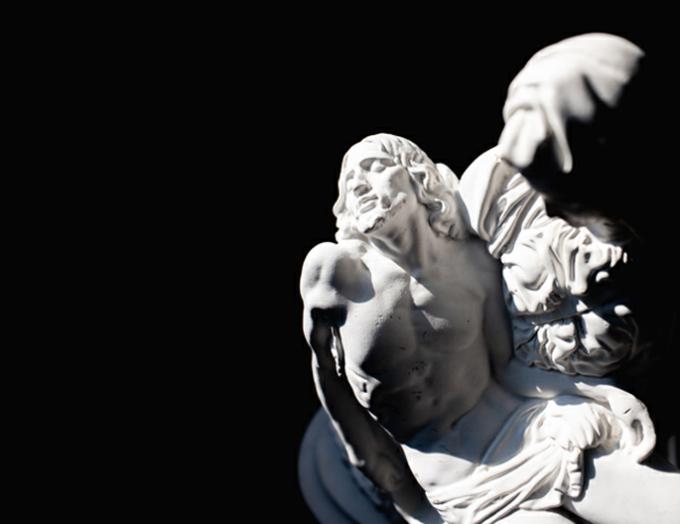
Spirituality
… I wonder if the Passion does not have an additional purpose of, as it were, sealing the identification of God with man.

Pakaluk
Here is a puzzle that theologians grapple with. It was not necessary for the Second Person of the Trinity to die on the cross in order to save the human race. Any act whatsoever by an incarnate God -- say, simply eating his breakfast as a boy -- because of the infinite excellence of his divine nature, would, if offered for that purpose, be enough to satisfy the demands of God's justice, not only for the sin of our first parents, but also every other sin ever committed or that ever will be committed by us.
So say all the reliable authorities. (It was not even necessary that the Son become incarnate. God was free to forgive all sins from heaven by a mere fiat. But this is another matter which I leave aside for now.)
But if so, then why did Jesus choose to suffer and die on a cross? Why did he say, and why has the Church always held, that our salvation was accomplished specifically on the cross?
Probably the best and most widely accepted explanation is that he needed to win our love, by showing his love. To see this, consider the case of a man who is captured by pirates, and the pirates say they will return him if a ransom is paid. So a friend pays the ransom; the pirates set the man free; and he eagerly returns home.
Now change the case to where his friend, rather than paying a ransom, offers himself as the ransom, in place of his friend. In this case, too, the man (although he might be torn) would be eager at least to leave the pirates and return home.
But we are not like this. Our original position, indeed, is that we are in bondage to sin and to Satan, as if held in captivity. However, we actually enjoy this bondage. It is not easy for us to "repent." This would be as if the man captured by pirates came to enjoy being among the pirates (something like this can actually happen and is called "the Stockholm Syndrome"), so that if you set him free he wouldn't leave: he would choose to stay where he is.
To save us fully, then, it is essential not simply to free us from the bondage of sin and of the punishment due to sin, but also to win back our affection, so that we want to return home again.
I think what I have stated so far is very helpful for Christians, because it explains why it is so fruitful for us to meditate frequently on the Passion of Our Lord. (Many saints have said that they ponder almost nothing else.) If it is the very purpose of the Passion, to win our love by displaying love, then we, as it were, match our intentions to the Lord's intention, if we devote ourselves to pondering it. St. Augustine says that truly the cross is the chair from which Our Lord gave instruction. St. Alphonsus advises us to "dwell in the shadow" of this chair and imbibe the teaching.
But I wonder if the Passion does not have an additional purpose of, as it were, sealing the identification of God with man. We know that at the moment of Our Lord's death the Temple curtain was torn from top to bottom. We tend to think of this event as representing the opening of heaven to earth. But suppose it just as much testifies to the opening of earth to heaven, so to speak, in the union of God with man in Our Lord?
What I mean is this. Whenever anyone from a higher status takes the place of someone in a lower status, he risks not really taking that person's place, because he always has an escape hatch, and is planning to return eventually to his higher status. And yet the person in the lower place has no escape hatch and will assuredly remain there.
To give a simple example: tourists on the look-out for "authentic experiences" of other cultures always have this problem. They can't really "live like the locals," because they are there only briefly. And maybe the locals have poor health care: while the tourists can always be transported away to find good care back home. (Walker Percy examines these "experience seekers" thoughtfully in his book, "The Message in the Bottle.")
But now consider: Jesus came down from heaven, and he was returning to heaven. He is, from eternity, a divine person (not a human person or even "human being"), who assumed human nature. Although he "emptied himself" of the glory due to God (Philippians 2:7), he tells us explicitly that at any moment he could, if he chose, call upon legions of angels to rescue him (Matt 26:53).
These are objective facts about a God-man that we must reckon with. How could a being who had such a nature fail to be in some respects at least like those tourists I mentioned? How does he show that he is fully one of us?
"All men are mortal." We take this statement so much for granted that logicians use it as the stock major premise to show logical inference. Not that his incarnation was not full and complete. Not that the hypostatic union wasn't perfect. But what more shows and effects solidarity with someone than dying along with him?
- Michael Pakaluk, an Aristotle scholar and Ordinarius of the Pontifical Academy of St. Thomas Aquinas, is a professor in the Busch School of Business at the Catholic University of America. He lives in Hyattsville, MD, with his wife Catherine, also a professor at the Busch School, and their eight children. His latest book is "Mary's Voice in the Gospel of John" available from Amazon.
Recent articles in the Spirituality section
-
Masters week foreknowledgeMichael Pakaluk
-
Why is Lent 40 days?Michael Pakaluk
-
The eloquent ambiguity of 'I believe'Bishop Robert Barron
-
You don't get what you pay forMichael Pakaluk
-
The witness of a consecrated lifeBishop Robert Barron























